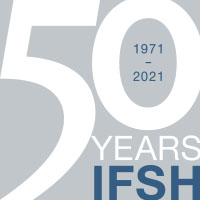Fruits of the Policy of Détente: How the IFSH got academic exchange with Eastern Europe and Eurasia off the ground
If one thinks back to the time of the Cold War, it becomes clear that academic exchange with former Soviet Union countries has never been self-evident. It took a variety of efforts in détente and dialogue between the NATO and Warsaw Pact states to pave the way for free civic exchange. The IFSH concept of cooperative arms control and the idea of change through rapprochement which underlies the policy of détente were important steps on this path. But even after the disintegration of the Soviet Union, sustained efforts were needed to develop pan-European cooperation. The Centre for OSCE Research at the IFSH (CORE), and a variety of institute activities that strengthened academic exchange with the post-Soviet region contributed to building bridges. If one were to map the IFSH's cooperative relationships in 2021, one could trace many lines from the institute to this region.

The exchange opened up new perspectives
As a researcher at the IFSH, I have been actively following the East-West relationship, in its continuities and changes, since 1990. Among other things, I maintain academic exchange with scholars and students from Eastern Europe and the former Soviet Union. This has led to a variety of exciting contacts and even long-term personal friendships with colleagues from Armenia, Georgia, Kazakhstan, Kyrgyzstan, Russia, Uzbekistan and Tajikistan. Their keen interest in peace research and their commitment to cooperation have opened up new worlds for me and my IFSH colleagues.
In the 1990s, the idea of opening up was in the foreground. As early as 1992, my IFSH research group on Eastern Europe held the first pan-European conference with representatives from seven newly independent states. Between 1995 and 1997, I worked with a Russian colleague on a joint research project for the first time. Not only has that scholar cooperated on many IFSH projects since then — many other colleagues have joined in and enriched IFSH research as well.

Since the turn of the millennium, academic capacity building and student exchange have come into focus. CORE received a mandate to play a leading role in the establishment of an OSCE Academy in Bishkek. After an agreement was reached between the group of sponsoring OSCE delegations and the Central Asian delegations, Kyrgyzstan’s Minister of Education visited the Institute and discussed the plan (https://ifsh.de/file-CORE/documents/jahrbuch/03/Evers.pdf). In the first years of the academy's existence, IFSH staff were mainly involved in developing the curriculum, teaching and fundraising. Gradually, regional lecturers took over these tasks. Thanks to the continuing financial support of OSCE participating States, the OSCE Academy is today a valued institution in the Central Asian educational landscape. Additional financial support from the OSCE and the German Academic Exchange Service enabled me to hold several summer school programmes at Kazakhstani, Georgian, Armenian and Kyrgyz universities and to teach at the German-Kazakh University from 2007 onwards.
Officers gained insight into the work of a peace research institute
The IFSH also supervised the Baudissin Fellowship Programme (funded by the Federal Ministry of Defence). Here, officers from the former Warsaw Pact states received scholarships for a research stay at the IFSH, during which they dealt primarily with the Bundeswehr concept of Innere Führung. The IFSH also participated in the CrossCulture Programme from the Institute for Foreign Cultural Relations, which enabled guests from the post-Soviet region to study peace research in Hamburg. Finally, together with a colleague from the Centre for Peace Studies at the Arctic University of Tromsø, I was able to acquire funding from the Norwegian Centre for Educational Cooperation. While working with the Eurasia Peace Studies Exchange network from 2017–2019, we were able to develop contemporary new forms of academic exchange between Europe and Eurasia. Exchange had become something that was no longer just about European knowledge, but about communicating with and learning from one another on equal footing. Lecturers and students from Georgia, Germany, Kyrgyzstan, Norway and Ukraine made decisions together about what they wanted to learn from each other and put this into practice during project weeks and many on-site research visits.

From the perspective of peace studies, the current lively academic exchange in and with the post-Soviet space is a reason to be hopeful. In recent years, however, authoritarian tendencies have been emerging in the region. Autocratic governments threaten to limit dialogue and cooperation. This makes it all the more important to not let contacts be severed and to continue working together on peace research in Europe and Eurasia.
The author Dr Anna Kreikemeyer is a researcher in the IFSH research area European Peace and Security Orders.








